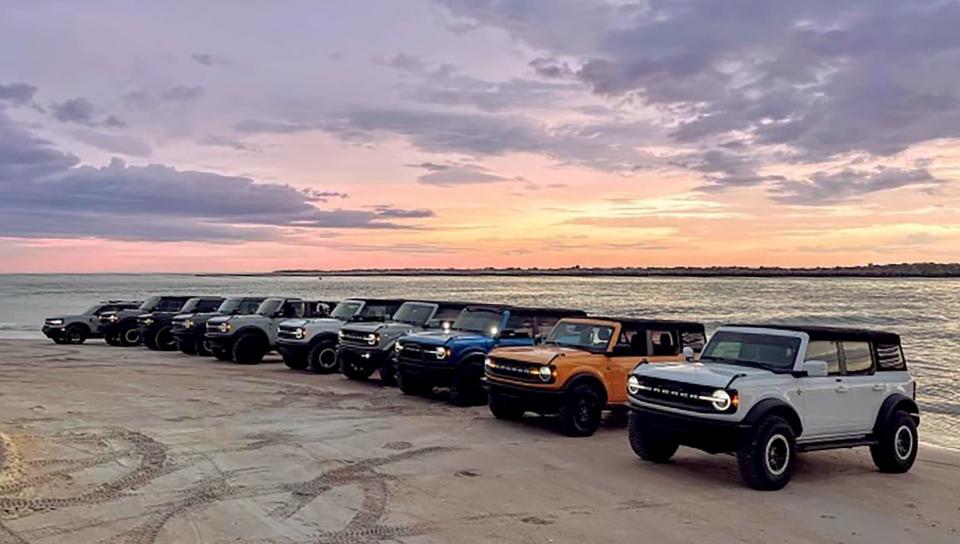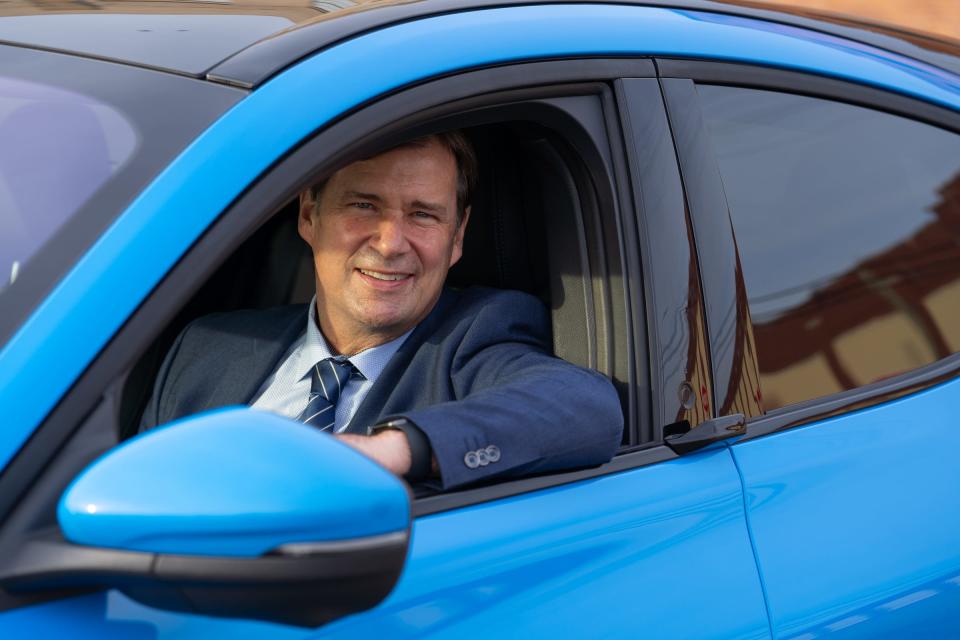Ford's 'self-inflicted' recalls, warranty costs put automaker at competitive disadvantage
Ford CEO Jim Farley has said again and again that reducing how much the company spends on recall and warranty work is vital for the iconic automaker, which has a long history of what industry analysts call self-inflicted wounds.
Yet costs to fix problems continue to grow with Ford's latest high-profile safety recalls.
Back-to-back-to-back recalls in recent weeks for issues ranging from spontaneous combustion to loss of power while driving at highway speeds puts Ford at a competitive disadvantage during a time when automakers are fighting to define themselves as market leaders, analysts say.
It is essential that Ford, like all automakers, focus its dollars on developing new products to compete in a rapidly-evolving industry that requires massive new investment, versus fixing mistakes.
"They are the No. 1 problem at Ford right now. And it's the worst in the industry when it comes to recalls and warranty work," said John McElroy, a longtime industry observer and host of "Autoline After Hours" webcast and podcast. "It’s been going on for years and they haven’t solved it yet."
New headaches
Recalls generally affect a whole production run of hundreds or thousands of vehicles that may have safety problems and involve automakers alerting federal regulators when they're caught. Meanwhile, warranty costs are filed by individual car owners as they discover problems.
These billions in costs are viewed by financial analysts as unforced errors.
Ford has cited in earnings reports the troubled launches of its 2020 Explorer and Aviator — and the launch of newvehicles, including the award-winning electric Ford Mustang Mach-E and the popular Ford Bronco, have not been without drama.
In recent weeks:
Federal safety regulators opened an investigation into the 2021 Ford Bronco for "catastrophic" engine failure while driving after 32 reported experiences from customers.
Ford stopped delivery of the 2022 Ford Mustang Mach-E in mid-June because of an outstanding recall related to the 2021-22 models losing power while driving. A fix is expected sometime in the third quarter, possibly as early as July.
Owners of the 2021 Ford Expedition and 2021 Lincoln Navigator filed a lawsuit against Ford because their vehicles have been recalled for a defect that may result in spontaneous combustion and the company has not identified a solution yet.
Ford notified regulators that the four-door 2021-22 Ford Bronco may have a defective child safety lock on the passenger side of the back seat, allowing young children to open the door from inside despite indicating otherwise.
Also, the past has come back to haunt Farley, who took the helm of Ford in October 2020 with the promise of improving quality.
Ford recalled 2.9 million vehicles earlier this month that may shift into different gears than intended or roll away while parked, specifically the 2013-19 Escape, 2013-18 C-Max, 2013-16 Fusion, 2013-21 Transit Connect and 2015-18 Edge.

These chronic costs frustrate Ford executives and consumers. Stockholders aren't thrilled, either.
"I own thousands of shares of Ford stock thinking that with the advent of electric vehicles the stock price would go up substantially. I was wrong primarily due to all the recalls and other screw-ups at Ford," said Jerry Decker, a financial analyst from Flushing who drives a 2019 Ford F-150.
"I suspect a large part of the problem is that they bought out or forced out older more experienced engineers for young ones. And now the young ones are making the same mistakes the older ones did when they were young," he said. "... How in the hell can they not figure out why their $100,000 SUVs keep burning up? Please ask Ford management how they plan to stop the recalls and if they plan to in some way get their more experienced engineers involved."
His concerns about buyouts and experience are echoed by industry analysts, including McElroy, who said Ford needs to work harder.
"They'll stop and say, 'This and this caused the transmission to malfunction and we've solved the problem.' But do they go a layer below? How did we end up with this problem? Was somebody on vacation and we didn’t know the engineer was gone?" McElroy said. "Was there a breakdown in communication between a supplier and Ford? Did they not have enough people? They're not digging deep enough to figure out the systemic problems that led to these defects."
'Speed is important'
To help with that, Farley this year recruited quality czar Josh Halliburton to contain the problem.
"We know the path to leadership in quality is not a fast one. The entire team is working very hard to create not only incredible products and experiences but high-quality ones," Halliburton told the Detroit Free Press after the third major recall this month.
"Speed is important in this industry but does not necessarily result in poor quality control. Ford has the right quality control systems in place," said Halliburton, who moved to Ford after a career at J.D. Power, a globally respected consumer research, data and analytics firm that focuses on quality.
Now it's a matter of execution.
"How we as a company handle the recalls is important," Halliburton said. "We also know that consumers value companies that act with integrity and transparency and that’s what we do. We want to provide customers the best experience possible with our vehicles and deliver a high-quality product."
In April, he referred to Ford as complacent and promised to change the culture.
More: 2020-21 F-150 windshields may come loose; 2020 Super Duty payload wrong
More: Appeals court: Ford committed fraud by selling defective Super Duty trucks
More: Ford wants defective Bronco hardtops to disappear forever after supplier issues
Jon Gabrielsen, a longtime auto industry consultant from Ann Arbor who now lives in Mexico, said, "Warranty and recall problems begin in product development when corners are cut and shortcuts are taken."
Whether at Ford or anywhere else, he said, "every component and every system in a developing vehicle must be tested to ensure that it will survive the rigors of the real world. Only by getting it right in product development can one avoid the recalls and safety issues three to 10 years later."

Without dramatic change, consequences could be dire, Gabrielsen said. "Only by dramatically increasing product development discipline and rigor today can Ford be confident it won’t be having the same issues in three years with things starting development today."
'Underperforming vs. peers'
Analyst Dan Levy of Credit Suisse global investment bank visited Ford in Dearborn in June, following the recall announcements.
He highlighted concerns in his investor note June 17.
"Quality challenges stem from issues with suppliers and design robustness," Levy wrote. Management "fully acknowledges quality is an issue that must be addressed, that Ford is underperforming vs. peers, and that warranty spend is not competitive vs. peers."

Flawed design rather than manufacturing problems led to the Mach-E recall specifically, Levy wrote. "Powertrain was also noted as an area where Ford has had quality issues. To address the issues, Ford is in the process of completely redesigning its end-to-end quality operating system to improve design robustness, which should drive earlier identification of issues."
Billions wasted
In 2020, Farley, then Ford chief operating officer, revealed warranty costs reached $5 billion in 2019, up $1.5 billion in recent years — and fixing vehicle launch problems had cost the company an estimated $1 billion.
All automakers have costs related to warranties and recalls, which ebbs and flows during different product cycles, but Ford executives have acknowledged consistently over the past two years the importance of conquering this cost problem.

In first quarter 2021, Ford CFO John Lawler touted "real improvement" in warranty costs, which the company "lowered by $400 million" from a year earlier. In the previous three years, he said during an earnings call, Ford saw its warranty expenses increase by more than $2 billion.
Worse than GM and even Apple
Eric Arnum, editor of Warranty Week, aggregates all warranty data for companies globally based on their federal regulatory filings. These costs include recalls.
"Ford was the largest claims payer of all in the U.S. last year," he said in April, "bigger than Apple, IBM, HP, Raytheon or even GM."
Arnum emphasized that all automakers have bad years with warranty and recall costs.
"It just so happens, it's Ford's turn in the doghouse," Arnum said this month. "I hope they recover from it. I expect they will."
More: 2021 Ford Expedition, Lincoln Navigator customers sue over unfixed fire risk
More: Ford recalls 350,000 SUVs including about 39,000 for engine fire risk
More: $70K Aviator up for a top automotive honor — but some buyers have horror stories
Every year, automakers set aside a dollar amount for every car sold to budget for anticipated warranty repair costs, which include recalls. According to Warranty Week data, Ford towered over its competitors in per vehicle budgeting in 2021:
Ford was $1,041 — up from $940 in 2020
General Motors was $713, up from $498 in 2020
Hyundai was $651, down from $1,171 in 2020
Stellantis NV was $630, up from $576 in 2020.
Meanwhile, Toyota fell from $423 to $401 in its fiscal year that ended March 31, 2022, and Honda plummeted by more than half from $782 to $347 during the same period, reported June 23. The other companies have a fiscal year that ends Dec. 31.
Ford has budgeted more for these repairs since 2017, when it was just $342 per vehicle.
In fact, Ford’s $1,041 accrual rate per vehicle sold in 2021 was its highest level ever, or at least since warranty expense reports went public in 2002, Arnum said. Second place was 2020 when Ford was at $940 and third is $591 in 2019.
What's going on?
In his investor note, Levy said he flew to Ford World Headquarters in Dearborn to meet with Stuart Rowley, chief transformation and quality officer, Kumar Galhotra, president of Ford Blue, Lawler, chief financial officer and Lisa Drake, vice president of EV industrialization/Ford Model e.
"We await further color from (management) on the root causes of the quality challenges, and how much work is required to bring quality to more appropriate levels, as we had been under the impression that warranty/quality challenges at Ford began to improve in 2021, but seem to have taken a clear step back," Levy wrote.
More: Ford workers break their silence on faulty transmissions: 'Everybody knew'
More: Ford pays $49K to couple for 2014 Fiesta, settles defective transmission cases
More: Ford Motor Company loses a top digital executive, company liaison to 'nervous' car dealers
Jd Marhevko, an award-winning quality management expert based in Saline who has worked for global companies including Delphi Technologies, BorgWarner and Accuride Corp., said warranty and recall situations can indicate that a company's "checks and balances are not as robust as the company wants them to be."
She said, "Leveraging lessons learned is also key. It's kind of textbook."

But manufacturing pressures to not fall behind schedule are intense.
"Our industry is not patient," Marhevko said. "If several folks are bidding on the same job, the one that can deliver first is likely going to win the bid. There is a saying that, 'He who gets to market first, wins.' "
'Let's just pray'
Joe McCabe, CEO of AutoForecast Solutions, said speed is the new reality and Ford happens to be first out of the gate with a new lineup of hot products.
"Ford is on the radar because so many of their (recall) announcements are coming together at the same time," he said. "But it's not a unicorn situation. It's the new nature of the beast. Ford's trying to go heavy into the electrification space with Mach-E and Lightning while trying to take on Jeep with the Bronco. They're trying to get vehicles out that are somewhat untested.”
"I truly believe it's a 'get to market now and fix it later' mentality that nearly every vehicle manufacturer follows," McCabe said. "It's 'let's just pray any issues are minor at best.' Companies cross their fingers. Everyone is trying to reinvent themselves at a very fast pace. The next 20 years is going to be off-the-charts insanity."
Car buyers are watching
What warranty and recall alerts do is identify potential reliability problems for consumers, and that's a big deal because word of mouth can strengthen or weaken brands, said Jake Fisher, director of auto testing at Consumer Reports.
"Vehicle reliability and fuel economy are the most important when people are purchasing a new car" based on industry data, he said. “You'll think twice about coming back to a brand that gives you problems."
"From our data, we generally see Ford and Lincoln having reliability problems, especially with new and redesigned vehicles," Fisher said. "Ford and Lincoln tend to make large changes when they redesign their vehicles, a lot of changes quickly."

By contrast, Lexus and Toyota tend to be more methodical, and it builds a loyal customer base, he said. "They’re very, very conservative when they launch new technology because they know people are coming to them not to be the most exciting but the most reliable. Ford is trying to do things to attract people, excite people. And they do have exciting products. Bronco has people buzzing. But they're already having recall and reliability problems."
Tiny details can make a huge difference on automotive quality — as illustrated consistently by Toyota, industry analysts often say.
More: Ford makes come-from-behind push with Mach-E as industry enters new era
More: Ford team had to plead with Bill Ford to give back not-yet-released Mustang
Mechanic Bob Elert, of Milford, a retired auto shop owner for 25 years in Pontiac and a former consultant to the General Motors Technical Assistance Center and car dealers, said automakers play a role in problems often blamed on suppliers.
"It’s because they put all the components out for bid and buy from the lowest bidder," he said, noting that his 1996 Toyota 4Runner SUV never had to recharge its air conditioning because it never developed a leak because the company used silicon rubber rings instead of neoprene rubber rings that degrade.
"Little touches like that," Elert said. "Toyota doesn't have recall problems on the scale of other companies."
'Faster, faster, faster'
New costs associated with problems can redirect company cash flow at the worst time.
Ford announced in March restructuring its business to create Ford Blue and Model e in March, so one team can build successful gasoline-powered vehicles while the other team can focus on electric vehicles. Key to the strategy, Ford executives said at the time, was slashing warranty costs and redirecting revenue for future technology.

As part of an electric revolution in the auto industry, female engineers play an important role, according to Glamour magazine in mid-June. Its article began with a quote from a top Ford engineer that unfortunately coincided with the recall events.
“We want to run at a different rhythm,” Lisa Drake, vice president of electric vehicle industrialization at Ford, told Glamour. “Faster, faster, faster.”
When asked how the comments may be misunderstood in the context of quality control, Ford told the Free Press that Drake was referring to the speed with which Ford needs to move to establish our electric vehicle business.
Trying to do better
Ford has a lot at stake with quality control and risks alienating potential car buyers.
"People would likely lose confidence in the brand," said Marcus Collins, a business professor at the University of Michigan.

Ford is not making excuses or denying the problems.
"Whether a gas or electric, all of us are focused on providing our customers high-quality vehicles," Halliburton said.
"We are promoting a culture that is obsessed with quality," he said. "This starts with how we prioritize our time and encourage a quality-first dialogue in the company. We want quality to not only be an attribute of our vehicles but a reason customers choose our products."
Contact Phoebe Wall Howard: at 313-618-1034 or phoward@freepress.com. Follow her on Twitter @phoebesaid. Read more on Ford and sign up for our autos newsletter.
This article originally appeared on Detroit Free Press: Ford recalls, warranty costs put automaker at disadvantage

